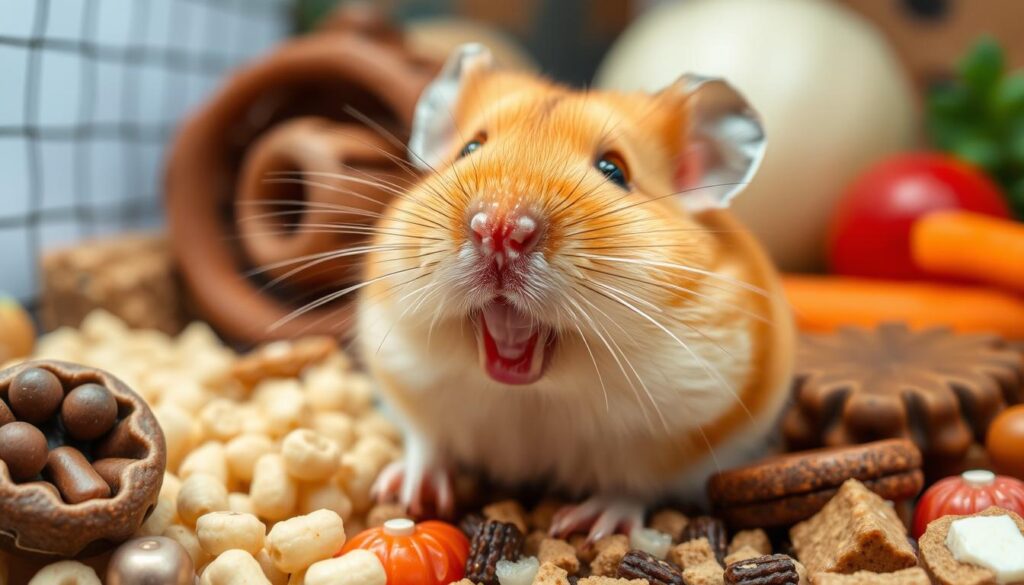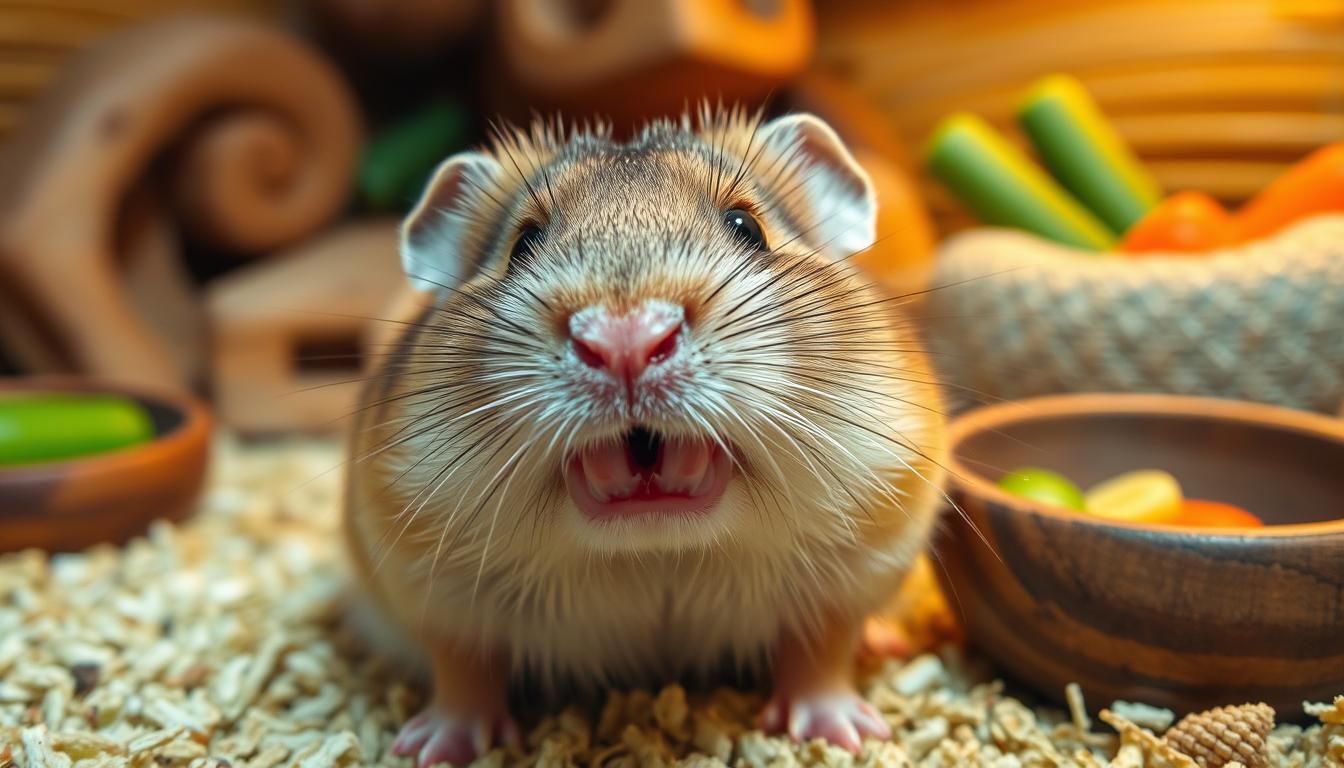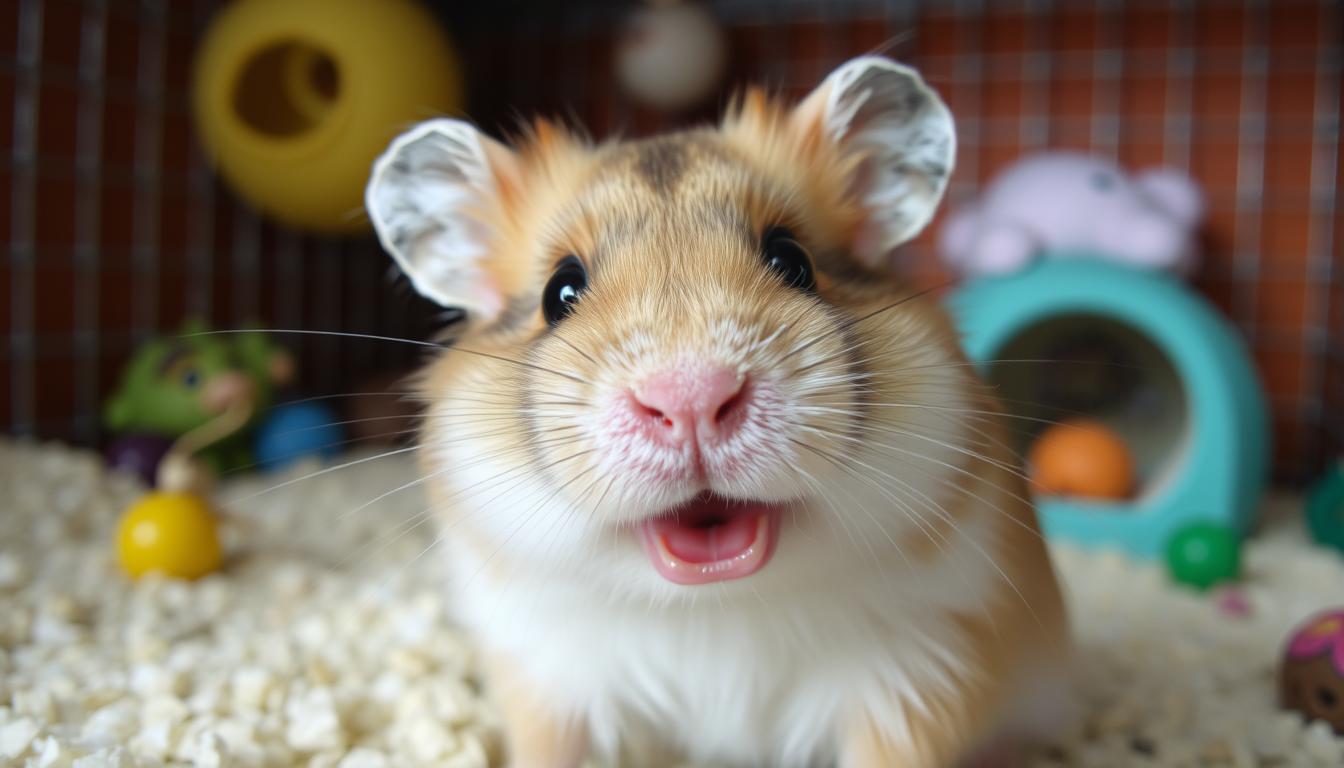Do you know that your furry friend’s teeth could be a big health risk? Overgrown hamster teeth can cause eating problems and even dental infections. But don’t worry, we’ve got you covered. This article will explain why this happens and give you tips to keep your hamster’s teeth in top shape.
Key Takeaways
- Understand the importance of continual tooth growth in hamsters
- Identify the signs of overgrown teeth and their potential consequences
- Discover the common causes of overgrown hamster teeth
- Learn effective preventive measures to maintain your hamster’s oral health
- Recognize the symptoms and behaviors associated with overgrown teeth
Understanding Hamster Dental Anatomy
Hamsters have a special dental setup that’s different from many small pets. Their teeth, including incisors and molars, grow continuously. This is key for chewing and grinding tough plant foods, which are a big part of their diet.
The Importance of Continual Tooth Growth
Hamsters’ teeth grow fast. If not kept in check, they can grow too long, causing dental problems. Their teeth grow to stay sharp for chewing. But, owners must watch out to prevent issues.
Signs of Overgrown Hamster Teeth
- Difficulty eating or chewing food
- Excessive drooling or saliva production
- Discolored or yellowish teeth
- Unusual or asymmetrical tooth positioning
Spotting overgrown teeth is key for your hamster’s health. Knowing about their dental needs helps keep them happy and healthy.
“Proper dental care is essential for the overall health and happiness of your hamster.”
Common Causes of Overgrown Hamster Teeth
Hamster dental problems, like excessive hamster tooth growth, have many causes. Knowing what leads to overgrown hamster teeth is key to keeping your pet’s mouth healthy.
An improper diet is a major cause of overgrown hamster teeth. Hamsters need a balanced diet with the right nutrients and enough roughage. Without it, their teeth can grow unevenly and too long.
Lack of chew toys is another factor in hamster dental problems. Hamsters must chew on different textures to keep their teeth in check. Without the right toys, their teeth can grow too long, causing pain and health issues.
Some health issues can also cause overgrown hamster teeth. Problems like metabolic disorders or dental malocclusions can make teeth grow too fast. This needs quick vet care.
“Keeping your hamster’s mouth healthy is vital for their overall health. Knowing why teeth grow too long helps you prevent and fix this problem.”

By understanding these causes of overgrown hamster teeth, you can give your pet the right care. This ensures their teeth stay healthy and functional. Taking care of hamster dental problems early on is crucial for their long-term health and happiness.
Preventive Measures for Healthy Teeth
Keeping your hamster’s teeth healthy is key to avoiding overgrown teeth. By acting early, you can help your pet stay in top dental shape for life.
Providing Appropriate Chew Toys
Hamsters always need to chew because their teeth grow forever. Giving them safe, tough chew toys is a great way to keep their teeth trimmed. Wooden blocks, hay cubes, and untreated cardboard are perfect choices.
Maintaining a Balanced Diet
Along with the right chew toys, a balanced diet is vital for your hamster’s dental health. Foods high in fiber, minerals, and vitamins help keep teeth strong. Regular vet visits can spot problems early and help tailor care for your hamster’s specific needs.

“Taking proactive steps to maintain your hamster’s dental health can prevent painful and costly issues down the road.”
Overgrown Hamster Teeth: Identifying the Problem
If you think your hamster’s teeth might be too long, watch how they eat and act. Trouble chewing or not wanting to eat could mean dental problems. Also, look for signs like a lot of drooling, teeth that don’t look right, and mood changes.
Observable Symptoms and Behaviors
Watching for signs in your hamster can help catch dental issues early. Look for chewing trouble, a lot of drooling, and mood changes. Also, check their teeth for any odd colors or shapes. Catching problems early is key to keeping your hamster’s teeth healthy.
Being alert to signs of overgrown teeth is crucial. It lets you act fast to help your hamster. Early action can keep your pet happy, healthy, and pain-free.
FAQ
What are the common causes of overgrown hamster teeth?
Overgrown hamster teeth can be caused by several factors. An improper diet lacking in nutrients or roughage is one. Not having enough chew toys is another. Health issues like metabolic disorders or dental problems also play a role.
How can I prevent overgrown hamster teeth?
To stop overgrown teeth, give your hamster safe chew toys like wooden blocks or hay cubes. A balanced diet with fiber, minerals, and vitamins is also key. Regular vet visits can catch health issues early and help keep your hamster’s teeth in check.
What are the signs of overgrown hamster teeth?
Signs of dental problems include trouble chewing or not wanting to eat. Excessive drooling, discolored teeth, and changes in behavior like lethargy or irritability are also signs. These can mean your hamster’s teeth are too long.
How do I properly care for my hamster’s teeth?
Keeping your hamster’s teeth healthy is vital. Offer safe chew toys to naturally wear down their teeth. A balanced diet with the right nutrients also helps. Regular vet visits are crucial for catching and treating any dental issues early.
What should I do if I suspect my hamster has overgrown teeth?
If you think your hamster’s teeth are too long, watch for signs and symptoms. Quick action is needed to keep their teeth healthy and prevent more problems. A vet can check your hamster, find the issue, and suggest the right treatment.


